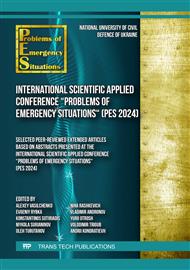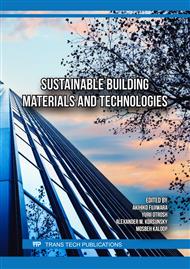[1]
L. C. Hollawey, Advanced polymer composites for structural applications in construction. Woodhead Publishingn Series. (2004) 784.
Google Scholar
[2]
Yu. Danchenko, V. Andronov, A. Skripinets, A. Kosse, E. Volnyanko, Decorative-protective epoxy compositions for the restoration of natural stone, AIP Conference Proceedings. 2490(1) (2023) 050015.
DOI: 10.1063/5.0142212
Google Scholar
[3]
D. L. Starokadomsky, Y. Danchenko, M. N. Reshetnyk, Resistant Polymer-Gypsum Composite Materials Obtained by Surface Modification or Impregnation of Gypsum by Acrylates, Epoxies and Siloxanes, Gypsum: Sources, Uses and Properties. (2022) 49–63.
DOI: 10.24214/jcbps.a.11.4.41626
Google Scholar
[4]
D. Starokadomskyy, Ye. Voronin, M. Reshetnyk, N. Siharyova, S. Shulha, N. Havrylyuk, L. Kokhtych, O. Starokadoms'ka, S. Vyshnevskyy, S. Hrebenyuk, Yu. Danchenko, «Morphology, Strength, Thermal and Chemical Stability of Epoxy Resin-Based Nanosystems with Pyrogenic Nanosilica A-300 and Its Compacted Analogue 'Densil' (With Original and Modified Surface)», Nanosistemi, Nanomateriali, Nanotehnologii. 19(1) (2021), 71–90 .
DOI: 10.15407/nnn.19.01.071
Google Scholar
[5]
V. Sopov, J. Danchenko, E. Latorez, Assess the Effectiveness of protective Concrete coatings of microbiological sulfuric acid Aggression, E3S Web of Conferences, 97 (2019) 02022.
DOI: 10.1051/e3sconf/20199702022
Google Scholar
[6]
A. Skripinets, Y. Danchenko, A. Kabus', A research on technological and physicochemical laws of manufacturing vibration-absorbing products based on epoxy-urethane polymer compositions. Eastern-European Journal of Enterprise Technologies. 3(11) (2015) 4–8.
DOI: 10.15587/1729-4061.2015.43324
Google Scholar
[7]
V. A. Andronov, Yu. M. Danchenko, A. V. Skripinets, O. M. Bukhman, Efficiency of utilization of vibration-absorbing polimer coating for reducing local vibration. Naukovyi Visnyk Natsionalnoho Hirnychoho Universytetu. 6 (2014) 85-91.
Google Scholar
[8]
L. Li, M. Mortazavi, H. Far, A. M. El-Sherbeeny, A. Ahmadian Fard Fini, Simulation and modeling of polymer concrete panels using deep neural networks. Case Studies in Construction Materials. 20 (2024) eo2912.
DOI: 10.1016/j.cscm.2024.e02912
Google Scholar
[9]
M. Ghosal, Polymeric Materials to Improve Durability and Sustainability of Cement Concrete: A Brief Overview. Foundation and Growth of Macromolecular Science: Advances in Research for Sustainable Development. (2024) 109–132.
DOI: 10.1201/9781003370505-7
Google Scholar
[10]
M. M. Rahman, M. Akhtarul Islam, Application of epoxy resins in building materials: progress and prospects. Polymer Bulletin. 79(3) (2022) 1949–1975.
DOI: 10.1007/s00289-021-03577-1
Google Scholar
[11]
P. V. Kryvenko, K. K. Pushkarova, V. B. Baranovskyi, M. O. Kochevykh, Yu. H. Hasan, B. I. Konstantynivskyi, V. O. Raksha, Budivelne materialoznavstvo. (2015) 624.
Google Scholar
[12]
Ye. M. Babych, V. S. Dovbenko, Pidvyshchennia mitsnosti zalizobetonnykh balok polimernoiu kompozytsiieiu. Zbirnyk naukovykh prats (haluz mashynobuduvannia, budivnytstvo. 1 4(39) (2013) 11–19.
Google Scholar
[13]
Ye. M Babych, V.S. Dovbenko, Blok-skhemy rozrakhunku zalizobetonnykh balok pidsylenykh polimernoiu kompozytsiieiu. Zbirnyk naukovykh prats (haluz mashynobuduvannia, budivnytstvo). 2 3(42) (2014) 11–19.
Google Scholar
[14]
A. V. Krasnyuk, A. L. Korejko, E. S. Harchenko, Issledovanie i razrabotka polimernyh sostavov na osnove epoksidnyh smol dlya remonta i zashchity betonnyh i zhelezobetonnyh sooruzhenij, Vі{TTP}1110 snyk Dnі{TTP}1110 propetr. nacі{TTP}1110 on. un-tu zalі{TTP}1110 zn. transportu і{TTP}1110 m. akad. V. Lazaryana. 9 (2005) 206–207.
DOI: 10.1126/science.1233508
Google Scholar
[15]
A. N. Berezyuk, N. I. Gannik, A. V. Gavrish, A. P. Martysh, A. N. Gajdar, Vliyanie dobavok poverhnostno-aktivnyh veshchestv na himicheskuyu stojkost' polimerbetonov. Vі{TTP}1110 snik PDABA. 3 (2011) 38–46.
Google Scholar
[16]
A. O. Korneeva, B. A. Bondarev, A. A. Kosta, A. A. Meshcheryakov, O. O. Korneev, Shrinkage of frame polymer concretes in road construction. E3S Web of Conferences. 410 (2023) 01013.
DOI: 10.1051/e3sconf/202341001013
Google Scholar
[17]
V. P. Berardi, G. A. Mancusi, A mechanical model for predicting the long term behavior of reinforced polymer concretes, Mechanics Research Communications, 50 (2013) 1–7.
DOI: 10.1016/j.mechrescom.2013.02.001
Google Scholar
[18]
K. S. Kharchenko, Analiz vplyvu ahresyvnoho seredovyshcha ta destruktsiinykh protsesiv na arkhitekturni elementy z polimerbetonu, Visnyk PDABA, 5 (2014) 45-50.
Google Scholar
[19]
D. Yu. Olejnik, V. Yu. Kajdalov, Ispol'zovanie polimerbetona dlya stroitel'stva smotrovyh shaht sistem vodootvedeniya. Komunal'ne gospodarstvo mі{TTP}1110 st. 114 (2014) 18–21.
Google Scholar
[20]
M. Dongpeng, Zhongming Liang, L. Yiping, J. Zhenyu, L. Zejia, Z. Licheng, T. Liqun, Mesoscale Modeling of Epoxy Polymer Concrete under Tension or Bending. Composite Structures. 256 (2021) 113079.
DOI: 10.1016/j.compstruct.2020.113079
Google Scholar
[21]
L. Yutian, M. Dongpeng, L. Yiping, J. Zhenyu, L. Zejia, Z. Licheng, T. Liqun, An Experimental Study on the Dynamic Mechanical Properties of Epoxy Polymer Concrete under Ultraviolet Aging. Materials. 14 (2021) 2074.
Google Scholar
[22]
Kai Pan, Zhiwei Xi, Huiping Lan, Yijun Lin, Haocheng Zhan, Lijie Wang, Modification of Epoxy Grouting Material in Toughness and Penetration, Gaofenzi Cailiao Kexue Yu Gongcheng/Polymeric Materials Science and Engineering. 39(12) (2023) 137–146.
Google Scholar
[23]
J. Jala, B. Nowacki, Enhancing Mechanical Properties of Composite Polymer Concrete with Lanthanum Oxide Additive for Potential Use in Anti-Radiation Applications. Composites Theory and Practice. 23(2) (2023) 104–109.
Google Scholar
[24]
W. Ferdous, A. Manalo, H. S. Wong, R. Abousnina, O. S. AlAjarmeh, Y. Zhuge, P. Schubel, Optimal Design for Epoxy Polymer Concrete Based on Mechanical Properties and Durability Aspects. Construction and Building Materials. 232 (2020) 117229.
DOI: 10.1016/j.conbuildmat.2019.117229
Google Scholar
[25]
S. Thangavel, P. K. Arumugam, S. S. Mayan, Study the Characteristic on Polymer Concrete with Waste Materials. AIP Conference Proceedings. 2766 (2023) 020070.
Google Scholar
[26]
V. R. Sankar, M. Natarajan, N. Balasundaram, G. Venkatesan, Investigation on Structural Characteristics of Fibre Reinforced Polymer Concrete. Journal of the Balkan Tribological Association. 29(5) (2023) 714–726.
Google Scholar
[27]
M. Abbasnejadfard, M. Bastami, S.-A. Hashemi, Experimental Investigation on the Stress-Strain Behavior of Unsaturated Polyester Polymer Concrete Subjected to Monotonic and Cyclic Loadings. Journal of Building Engineering. 48 (2022) 103966.
DOI: 10.1016/j.jobe.2021.103966
Google Scholar
[28]
P. Torkittikul, T. Nochaiya, A. Chaipanich, The Investigation of Polyester Resin Polymer Concrete with Various Amount of Construction Aggregate. AIP Conference Proceedings. 2279 (2020) 100004.
DOI: 10.1063/5.0023372
Google Scholar
[29]
A. Seco, A. M. Echeverria, S. Marcelino, B. Garcia, S. Espuelas, Durability of Polyester Polymer Concretes Based on Metallurgical Wastes for the Manufacture of Construction and Building Products. Construction and Building Materials. 240 (2020) 117907.
DOI: 10.1016/j.conbuildmat.2019.117907
Google Scholar
[30]
C. Kiruthika, S. Lavanya Prabha, M. Neelamegam, Different Aspects of Polyester Polymer Concrete for Sustainable Construction. Materials Today: Proceedings. 43 (2020) 1622–1625.
DOI: 10.1016/j.matpr.2020.09.766
Google Scholar
[31]
F. L. Kapustin, A. F. Kapustin, Influence of Plasticizers on the Properties of Fine-Grained Polymer Concrete. Solid State Phenomena. 299 SSP (2020) 72–77.
DOI: 10.4028/www.scientific.net/ssp.299.72
Google Scholar
[32]
Li Cong, Bai Jinrong, Jiang Ying, Xiao Huigang, Wang Wei, Xu Fan, Investigating the Seepage Control and Plugging Capabilities of Polyurethane-Cement Composites: A Comprehensive Study on Material Properties, Construction and Building Materials. 416 (2024) 135191.
DOI: 10.1016/j.conbuildmat.2024.135191
Google Scholar
[33]
S. I. Haruna, Han Zhu, I. K. Umer, Jianwen Shao, Musa Adamu, Yasser E. Ibrahim, Gaussian Process Regression Model for the Prediction of the Compressive Strength of Polyurethane-Based Polymer Concrete for Runway Repair: A Comparative Approach. IOP Conference Series: Earth and Environmental Science. 1026(1) (2022) 012007.
DOI: 10.1088/1755-1315/1026/1/012007
Google Scholar
[34]
Fei Mingen, Luo Chenhui, Zheng Xiaoyan, Fu Tengfei, Ling Kunqi, Chen Han, Liu Wendi, Qiu Renhui, High-Performance Pervious Concrete Using Cost-Effective Modified Vinyl Ester as Binder. Construction and Building Materials. 414 (2024) 134908.
DOI: 10.1016/j.conbuildmat.2024.134908
Google Scholar
[35]
K. Jozefiak, R. Michalczuk, Prediction of Structural Performance of Vinyl Ester Polymer Concrete Using FEM Elasto-Plastic Model. Materials. 13(18) (2020) 4034.
DOI: 10.3390/ma13184034
Google Scholar
[36]
Xu Jie, Tang Jinxui, Gao Chang, Wang Rui, Wang Wenbin, Meng Zhenya, Liu Jiaping, Synergistic Toughening Mechanism of Concrete Based on Polymerization of Acrylamide Monomer and Wollastonite Whisker, Kuei Suan Jen Hsueh Pao. Journal of the Chinese Ceramic Society. 52(2) (2024) 533–544.
Google Scholar
[37]
K. Naga Rajesh, P. Markandaya Raju, K. Mishra, P. Srinivasa Rao, Performance of cement mix plus and styrene butadiene rubber polymers in slag based concrete, International Journal of Mechanical and Production Engineering Research and Development, 10(3) IJMPERDJUN2020135 (2020) 1527-1538
Google Scholar
[38]
M. H. Niaki, M. G. Ahangari, Polymer Concretes: Advanced Construction Materials. Polymer Concretes: Advanced Construction Materials. (2022) 1–152.
DOI: 10.1201/9781003326311
Google Scholar
[39]
C. Lora, J. Ocampo, B. Valdez, M. Schorr, Applications of polymer concrete in corrosive environments. MRS Advances. 1815 (2015) 1–4.
DOI: 10.1557/opl.2016.86
Google Scholar
[40]
O. G. Maslov, D. V. Savelov, Rozrobka strukturnogo skladu polі{TTP}1110 mernogo betonu. Vі{TTP}1110 snik KrNU і{TTP}1110 m. M. Ostrograds'kogo. 4/2018 (111) (2018) 94–99.
Google Scholar
[41]
N. N. Kruglickij, G. P. Bojko, Fiziko-himicheskaya mekhanika cementno-polimernyh kompozicij, Kiev: Nauk. dumka, (1981) 240.
Google Scholar
[42]
Yu. M. Danchenko, A. I. Kariev, T. M. Obizhenko, Corrosion-resistant polymer concrete based on thermosetting resins for building purpose (review). Naukovyi visnyk budivnytstva. 3(105) (2021) 140–154.
Google Scholar
[43]
N. A. Samigov, V. I. Solomatov, Tekhnologiya karbamidnogo polimerbetona, Tashkent, (1987) 105.
Google Scholar
[44]
D. Tomas, Blumfі{TTP}1110 l'd Kanalі{TTP}1110 zacі{TTP}1110 jnі{TTP}1110 truboprovodi z polі{TTP}1110 merbetonu. Nauka і{TTP}1110 tekhnі{TTP}1110 ka. 12 (2000) 9–10.
DOI: 10.1039/c4ce01928h
Google Scholar
[45]
Yu. M. Danchenko, R. O. Bykov, M. P. Kachomanova, T. M. Obizhenko, N. H. Bilous, A. V. Antonov, Ekolohichno bezpechni epoksyaminni napovneni kompozytsii nyzkotemperaturnoho tverdinnia. Vostochno-Evropeiskyi zhurnal peredovykh tekhnolohyi. 6 10(66) (2013) 9–12.
Google Scholar
[46]
V. V. Poturoev, Tekhnologiya polimerbetonov, (1987) 286.
Google Scholar



